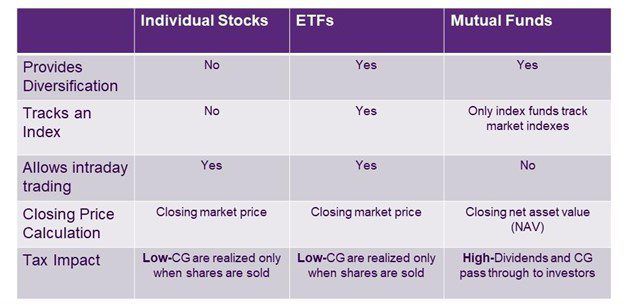By Barbara O’Neill, Ph.D., CFP® and
Martie Gillen, Ph.D., MBA, AFC®, CFLE
Three places where investors frequently place their money to grow over the long term are stocks, bonds, and exchange-traded funds (ETFs). Personal Finance Managers likely get asked many questions about them. This post describes the characteristics of each investment and the key differences among them as shown in the table below.

Stocks
Common stocks are shares of ownership in one corporation. Therefore, there is no diversification. Shareholders are part-owners of the company and have voting rights on certain company businesses. Stocks allow intraday trading (i.e., buying and selling shares on the same trading day) and share prices fluctuate constantly throughout the day. At the end of each stock trading day, stocks are valued at their closing market price. Income taxes are owed on stocks in the year that dividends are received and when investors realize a capital gain by selling their shares for more than the tax basis (original purchase amount + commissions + reinvested dividends).
Mutual Funds
Mutual funds are a diversified portfolio consisting of stocks, bonds, and other securities. They are managed by a professional investment company and collectively owned by many investors whose deposits are pooled together. Advantages include reduced risk of loss due to diversification, liquidity, and automatic deposit and withdrawal features. Disadvantages include annual taxable distributions that must be passed through to investors and higher expense ratios (i.e., expenses as a percentage of fund assets) than ETFs. At the end of each trading day, mutual funds are valued at their closing net asset value (fund value ÷ number of shares). A popular mutual fund category is index funds designed to track a benchmark market index such as the S&P 500.
ETFs
ETFs are similar to index-tracking mutual funds but trade like stocks on a stock exchange. The oldest ETF was launched 30 years ago in January 1993. ETFs have been gaining market share on mutual funds but mutual funds still have three times the amount of assets that ETFs have. Like mutual funds, ETFs offer broad diversification. Like stocks, ETFs allow intraday trading, are valued at their closing market price, and trigger income taxes when shares are sold and investors have a capital gain.
Comparison Decision-Making
Investors often select mutual funds or ETFs over individual stocks, which require time and expertise to select and manage. Investors must also buy multiple stocks to achieve adequate diversification, which can be costly. Both mutual fund and ETF portfolios are already diversified. Reasons to select ETFs over mutual funds are the absence of annual taxable distributions of fund dividends and capital gains and generally lower expenses.
Cover photo by Lance Cpl. Alex Fairchild on dvidshub.net













